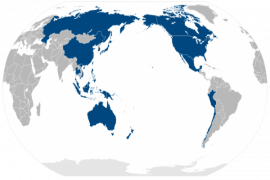To stay competitive, small businesses have to adapt quickly to the new realities of the marketJakarta (ANTARA) - As the COVID-19 pandemic drives more consumers online, small businesses need to go digital, according to the latest policy brief by the APEC Policy Support Unit and The Asia Foundation.
The impact of COVID-19 containment measures has brought more consumers online and subsequently necessitated firms, particularly small businesses, to go digital, the APEC Policy Support Unit noted in a written statement received here on Monday.
The report, titled "Supporting MSMEs’ Digitalization Amid COVID-19," puts forth a recommendation to policymakers around the Asia-Pacific region to prioritize facilitation measures to make it easier for small businesses to operate online based on the fact that the window between business survival and closure is narrowing amid the pandemic.
"To stay competitive, small businesses have to adapt quickly to the new realities of the market," Director of the APEC Policy Support Unit Denis Hew stated.
"There is little to no choice at all for them but to go digital, especially considering that containment measures will likely persist for some time or need to be re-introduced," he noted.
Hew explained that the role of small businesses is exceedingly substantial in the APEC region. Those firms contribute between 40 to 60 percent to the gross domestic product (GDP) in most economies and employ some 60 percent of all workers across the 21 members. Nearly 150 million businesses in the region are considered to be small scale.
The report finds that promoting the adoption of digital tools and solutions will help small businesses tap new revenue streams, reduce costs, and eliminate pain points during the COVID-19 crisis, especially pertaining to managing transactions at a distance, delivering goods efficiently, and engaging with consumers.
Despite the benefits, it is crucial to recognize that digital solutions are not a panacea and have their own set of challenges, including cybersecurity and data privacy concerns, exposure to digital fraud, misinformation and digital divide, and infrastructure issues.
"Governments across the APEC are providing relief measures for small businesses, including payment deadline delays, rate cuts, income tax exemptions, wage subsidies, soft loans, and refinancing," APEC Policy Support Unit Analyst, Andre Wirjo, who co-authored the policy brief, expounded.
"Policymakers should proactively adopt a two-pronged approach for allowing small businesses to reap the benefits while overcoming the challenges of going digital," Wirjo stated.
The report also highlights policy recommendations that policymakers can consider in their endeavors to expedite benefits for small businesses in going digital, especially those in the food and beverage sector as well as the retail and wholesale sector.
The recommendations include focusing on overcoming the digital divide and onboarding, promoting lower data costs, encouraging digital literacy, supporting access to mobile money and financial technology, boosting trust in digital solutions, addressing competition issues, and advancing regional cooperation and public-private partnerships.
Moreover, amid the evolving COVID-19 situation, the report suggests APEC policymakers to consider intensifying their support to other sectors, such as tourism and hospitality. Related news: COVID-19 crisis to deepen economic slump in APEC: report
Related news: APEC to boost supply chains, promote digitalization to aid recovery
EDITED BY INE
Reporter: Yuni Arisandy Sinaga
Editor: Fardah Assegaf
Copyright © ANTARA 2020












